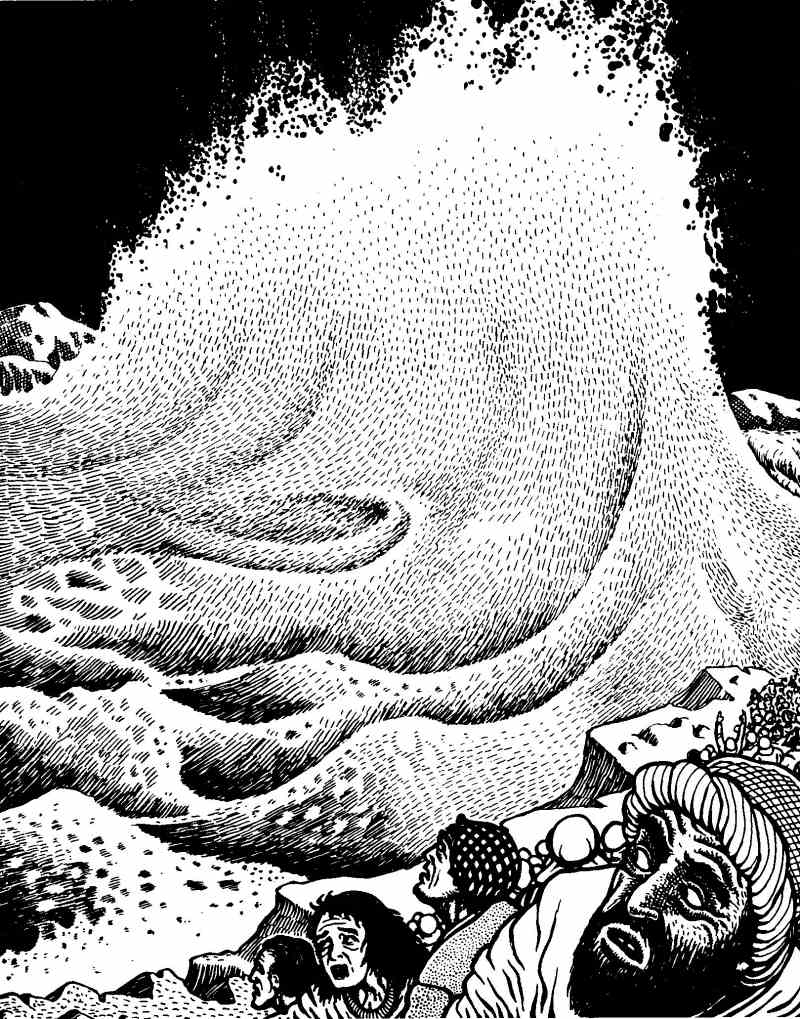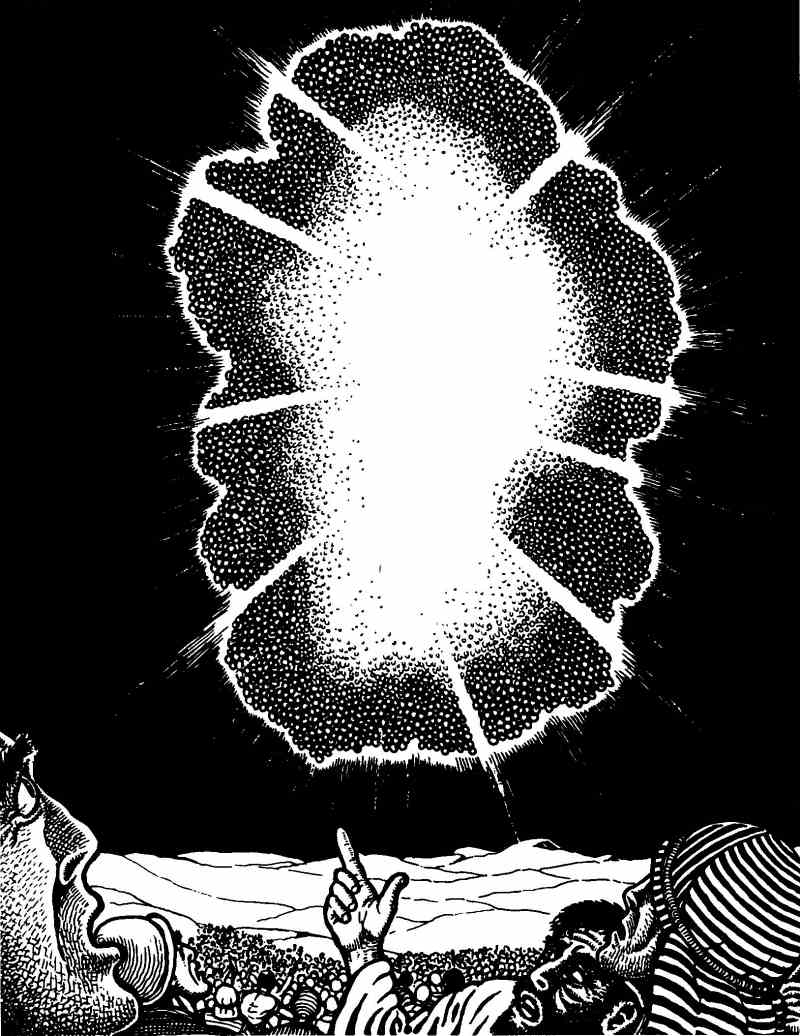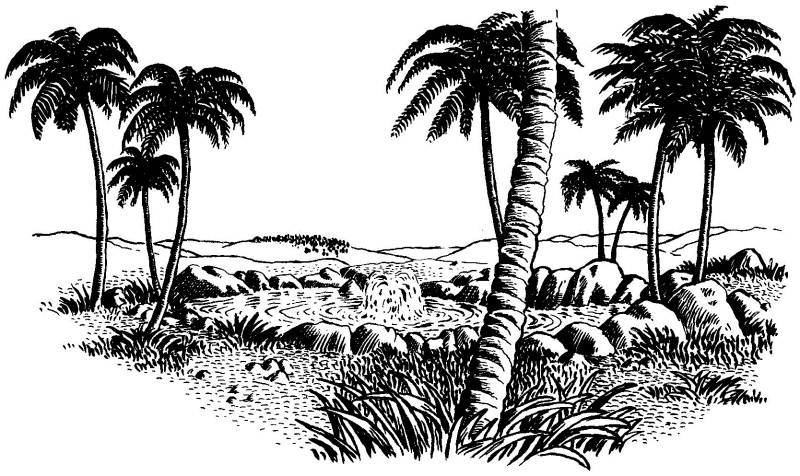WHILE the Egyptians struggled in the mud, the rear of the Israelite column emerged from the trough in the sea. A mounted messenger took word to Moses that the last of the people had crossed over. Moses thereupon obeyed God's order to hold his hands out toward the sea.
The Army of Egypt Perishes
At that moment the long walls of water collapsed and rushed together with the monstrous force of two gigantic jaws. They snapped together on the Egyptians, destroying all of them at once. (Verse 28) Thus was the sudden end of the army of the man who had schemed to wipe out a people God had chosen for a special task in His plan for the future. Pharaoh's role in those events meant that he and his men had also been a part of that plan, but in a much different and limited way.
Moving to the south along the east shore of the sea, the Israelites were startled to see the water abruptly recede from the shore. At the same time there was a thunderous roar. A giant curtain of foam spewed skyward all along the area where they had crossed the gulf. They were too far away to notice the men, horses and chariots in that gushing water. They didn't know how their pursuers had died until later when they found carcasses strewn along the shore.
When they realized, in part, what had happened, they were thankful that God had performed mighty miracles for their protection. Then they regretted doubting God's power and complaining so bitterly to Moses.

The two sections of water crashed together, forcing a long,
frothy curtain of water into the sky across the Red Sea gulf.
|
For their benefit, they were glad to see more than corpses come out of the sea. Chariots were washed up equipped with arms, leather and metal, all of which would prove to be of great resource on a trip that was to last much longer than they expected.
Moses Assembles the People
Before going farther, the Israelites gathered together, at Moses' direction, to thank God for bringing them out of Egypt. A special hymn of gratitude and praise was sung and played. This was undoubtedly the greatest and most volumed expression of thanks ever to be given to God from a crowd. (Ex. 15:1-19) Even appropriate dancing, led by Miriam, a sister of Moses and Aaron, was used as a part of the worship. (Verses 20-21)
Moving into the Desert
Water was plentiful where the people had assembled. They watered their animals well and filled all empty containers because they were headed toward arid territory on the west edge of the Sinai Peninsula. On the first night on the east side of the Red Sea they camped on uncomfortably warm sand and rock where there was no sign of water.
Next day the water supply dwindled rapidly during the march through even more arid territory. When they camped for the second night, it appeared that getting through a third day without finding water would be at the risk of illness and the loss of many animals.
The next afternoon was even more miserable than the one before. Just when many were becoming too thirsty and discouraged to force themselves or their animals on, a grove of palm trees was sighted in the distance. It turned out to be, to the encouragement of those foremost in the column, an old oasis called Marah. As the people moved closer, they were overjoyed to see a pool of water in the midst of the trees. Some of them rushed forward to fall down at the pool and wildly scoop water into their mouths.
The avid gulping stopped as abruptly as it had started. The water was too bitter to keep on swallowing!
The crowd around the well grew swiftly. Everyone had to test the water for himself and spit it out. This disappointment brought loud complaints, and the complainers accused Moses of being to blame. (Verse 24) Moses was so dismayed that he pleaded with God to intervene in the matter.
The Water Becomes Sweet
"There is an unusual tree you will find growing by the pool," God told Moses. "Cut it down and toss it into the water."
On seeing their leader hack down a tree and throw it into the pool, many in the growing crowd must have wondered at such peculiar behavior. But from that moment on, those who tasted the water could be seen obviously to be enjoying it.
"This water is as good as that of the Nile!" someone exclaimed. "Why are so many people saying it's bitter?"
This remark led to a rush of people to the pool. In spite of the heavy demand for water for hours, the springs under the pool continued the supply. This additional miracle strengthened Moses' faith in God. One would suppose it would have done the same for all the Israelites, but there were those who felt that matters were going too roughly for them.
"Tell the people that as long as they obey Me I will be their healer and keep them in good health," God instructed Moses. (Verse 26)
Since that time only a small part of the world's people have observed God's laws, although millions claim to be Christians. The relatively small number of obedient ones have enjoyed the protection and healing God back then promised His followers. In the near future, when vast throngs will be keeping God's laws, good health and prosperity will spread over the Earth. God always keeps His promises.
On to Sinai
Refreshed with water and rest, the Israelites and their animals continued south. At Elim, about twenty miles from Marah, they found twelve water wells, one for each of the tribes. That and a grove of seventy (the number of Israelite elders) palm trees made the place pleasant for camping.
A few miles south of Elim they were guided a little more to the east to go deeper into the desert. At this stage of the journey many of the people started much complaining again. Moses and Aaron were blamed for a lack of food. More than a few contended it would be better to be dead back in Egypt. (Ex. 16:3) As before, Moses had to look to God for a miracle to calm the grumblers.
God Acts for Moses
"I have heard the complaints of the people," God told Moses. "Remind them that I am aware of their needs. I shall supply them with bread in the morning and flesh in the evening. The bread they must gather for themselves every day except on My holy Sabbath. To take care of that day, they must gather twice as much on the sixth day." (Ex. 16:4-5)
God gave Moses instructions for helping keep the people under control. This information was passed on to Aaron, who reminded the Israelites how merciful, generous and patient God had been to them even after their impatience and grumbling.

The Israelites became fearful when the cloud glowed brighter and brighter.
|
As Aaron spoke, eyes were drawn to the guiding cloud, which had come to a halt. In the month it had been above and ahead of the column, it had become as commonplace to the people as was the sun, which should at any time cause awe. They watched in wonder as the cloud pulsated and glowed in vivid colors. When it became so brilliant that it began to hurt their eyes, they became apprehensive.
A booming sound like the voice of a mighty giant burst out of the brilliance. It lasted just long enough for the listeners to know that they had heard a syllable of sound from the throat of their Creator or one of His angels. The cloud ceased glowing and moved on, leaving the fear-filled millions sobered and regretful because of their disrespectful attitudes.

Many Israelites recalled at that time how their first columns had previously topped a dune to
joyfully welcome the sight of one of the pools at Elim. God was providing for them — after all!
|